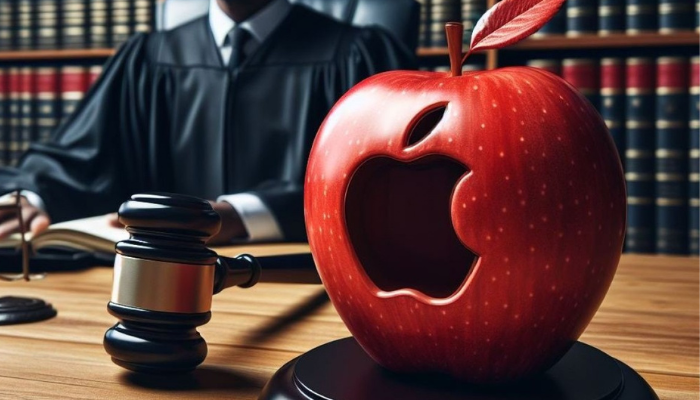US accuses Apple of ‘broad, sustained, and illegal’ smartphone monopoly
5 min read
Justice Department lawsuit alleges tech giant illegally prevented competition by restricting access to its software and hardware
On Thursday, the US government filed a comprehensive antitrust case against Apple, accusing the tech giant of unlawfully stifling competition through limitations on access to its software and hardware. The case targets fundamental aspects of Apple’s products and operations, including its iMessage platform and the connectivity of devices like the iPhone and Apple Watch.
The lawsuit, filed in federal court in New Jersey, alleges that Apple wields monopoly power in the smartphone market and employs its control over the iPhone to carry out a wide-ranging, unlawful course of conduct. The complaint aims to “liberate smartphone markets” from Apple’s anticompetitive actions, contending that the company has stifled innovation to preserve its market dominance.
US Attorney General Merrick Garland stated in a press conference on Thursday, “Apple has maintained its power not due to its superiority, but because of its illegal exclusionary practices.” He emphasized that monopolies like Apple’s jeopardize the integrity of the free and fair markets on which our economy relies.
The US Department of Justice’s lawsuit against Apple is a groundbreaking case that takes aim at the world’s most valuable publicly traded company. It comes in the wake of a series of antitrust lawsuits targeting major tech firms. Amazon, Apple, Meta (formerly Facebook), and Google have all come under regulatory scrutiny in the United States and Europe. These investigations allege that these companies have amassed power illegally, stifling competition. Each of these tech giants boasts a market capitalization exceeding a trillion dollars.
Apple has refuted the accusations in the lawsuit, arguing that they pose a threat to the fundamental operations of the company.
According to an Apple spokesperson, the lawsuit jeopardizes the core identity and innovative spirit of Apple’s products in fiercely competitive markets. If successful, it could impede Apple’s ability to develop the innovative technology expected by its customers, which seamlessly integrates hardware, software, and services. The spokesperson also warned that a favorable ruling for the plaintiffs could establish a risky precedent, giving governments undue influence over the design of consumer technology. Apple firmly believes that the lawsuit is unfounded both in fact and in law, and the company intends to vigorously defend its position.
At the heart of the legal battle is whether Apple’s practice of restricting rival companies from accessing its proprietary features, such as iMessage and Siri, constitutes anticompetitive behavior. Additionally, the case will scrutinize whether Apple’s strategy of facilitating easy integration among its own devices while limiting compatibility with non-Apple products unfairly restricts market access for competitors.
The Department of Justice’s complaint claims that Apple has engaged in several anticompetitive practices. These include blocking innovative apps, reducing the functionality of non-Apple smartwatches, restricting third-party digital wallets, and hindering cross-platform messaging. The complaint argues that these actions have led to higher prices for consumers by stifling meaningful competition.
Garland stated that Apple imposes barriers and makes it exceedingly challenging and costly for both users and developers to explore beyond the Apple ecosystem. The complaint alleges that these practices have been ongoing for over a decade and are part of a longstanding strategy by the company to target technologies that threaten its market dominance.
The lawsuit seeks several changes to Apple’s business practices and demands an unspecified amount of money as a penalty for its actions. It requests the court to prohibit Apple from using contract terms and conditions to solidify its monopoly and to prevent the company from using its app store and private APIs to impede the distribution of cross-platform technologies.
Apple holds a significant share of the smartphone market, surpassing Samsung last year to become the industry’s leading phone maker. The company frequently highlights the seamless compatibility of its products. However, opposing tech companies, with Google at the forefront, have criticized Apple’s features, characterizing them as creating a closed environment that harms consumers. These companies have encouraged regulators to investigate Apple’s practices. In November, Apple agreed to enhance text messaging between iPhones and Android devices.
A recent incident that caught the eye of regulators involved Apple’s dealings with the messaging startup Beeper. Last year, Beeper introduced a product aimed at enabling non-iPhone users to exchange iMessages. In December, Beeper launched its “Beeper Mini” app. However, Apple seemingly discovered methods to deactivate the app’s features less than a week later, citing privacy and security reasons in a vague statement. Beeper attempted to reinstate its services, leading to a series of exchanges between the two companies. Ultimately, Apple blocked external access to its iMessage features.
“Afterward, Beeper’s CEO, Eric Migicovsky, acknowledged in a statement on the company’s blog that, as much as they wanted to advocate for what they believed was a fantastic product that should exist, they couldn’t prevail in a cat-and-mouse game with the world’s largest company.
Recent reports indicate that executives from Beeper and the tracking service Tile have spoken with investigators. Tile has been vocal about Apple’s AirTags, which offer a similar function to Tile’s product, and has urged regulators and lawmakers to investigate potential antitrust violations.
Speculation and anticipation surrounding the antitrust suit have been growing since the beginning of the year, with several reports suggesting that the government was nearing the final stages of filing. In February, Bloomberg reported that Apple’s lawyers had met with Assistant Attorney General Jonathan Kanter in a last-ditch effort to dissuade the Justice Department from pursuing the case.”
The Justice Department has been investigating whether Apple violated antitrust laws since at least 2019, as part of a broader effort to probe anticompetitive practices among major tech companies. This initiative has led to several prominent antitrust cases, such as the trial involving Google’s search engine in 2023 and another concerning Google’s advertising business scheduled for later this year. Concurrently, the Federal Trade Commission has initiated antitrust lawsuits against Meta, Facebook’s parent company, and Amazon, although these cases have yet to reach trial.
In Europe, regulators are also increasing pressure on Apple. The European Commission imposed a €1.8 billion ($1.95 billion) fine for violating antitrust laws. This investigation was sparked by Spotify’s complaint to regulators, alleging that Apple was imposing restrictions on its app store to the detriment of other music streaming providers in favor of Apple Music.



